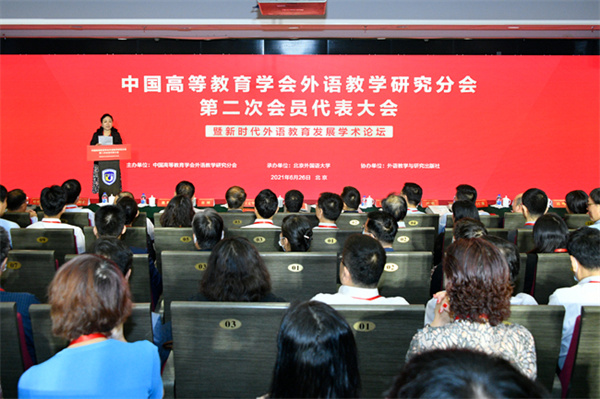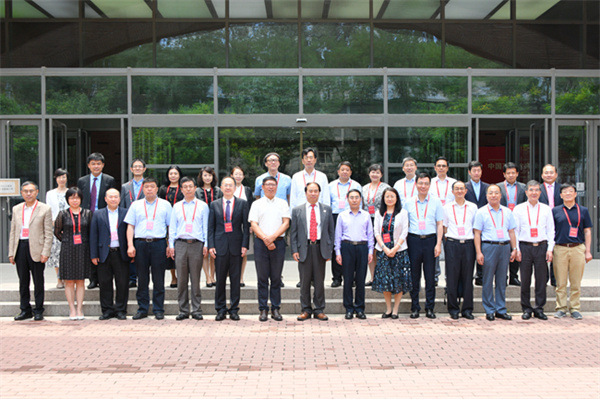- Research
- Research Centers
- Journals
- Admission
- Introduction
- Programs
- Application
- Alumni & Giving
- Alumni Club
- Giving
The Foreign Language Teaching and Research Institute of the China Association of Higher Education (CAHE) held its second congress and a parallel forum on the development of foreign language education in the new era at Beijing Foreign Studies University (BFSU) on June 26.

The Foreign Language Teaching and Research Institute of the China Association of Higher Education (CAHE) holds its second congress and a parallel forum on the development of foreign language education in the new era at Beijing Foreign Studies University (BFSU) on June 26.
Yang Dan, deputy secretary of the Party committee and president of BFSU, extended warm congratulations to the CAHE Foreign Language Teaching and Research Institute on the opening of its second congress, welcomed the arrival of all participants, and expressed heartfelt thanks to other universities and colleges for their long-term support of both the institute and the university.
The institute should fulfill its historic mission, explore new approaches to promote the development of foreign language education, and innovate research methods of foreign language in the new era, Yang noted.
He stressed that BFSU, where the new secretariat of the CAHE Foreign Language Teaching and Research Institute resides, should seek integrated development among its academic disciplines of foreign language, join academic disciplines of foreign language and non-foreign language majors, and link with other top universities at home and abroad to further promote its foreign language education featuring global language, global culture and global governance.
Yang added that BFSU will do its utmost to support the normal operation of the institute.
Hao Qingjie, deputy secretary-general of the CAHE, praised the work of its first council, and urged members of its second council to better fulfill their duties, focus on major work and promote high-quality.
For their part, delegates to the congress heard a work report of the first council of the CAHE Foreign Language Teaching and Research Institute and selected 231 people into the institute’s second council with Wang Dinghua, Party chief of the BFSU, as director-general.
Wang said in his speech that it was a great event for the academic circle of foreign language in China to hold such an election of the second council of the CAHE Foreign Language Teaching and Research Institute ahead of the centenary of the founding of the CPC on July 1.
Wang analyzed the opportunities and challenges inherent in the education of foreign languages today. He proposed that the teaching and research of foreign languages should foster fine character and civic virtue among young people, equip them with the necessary competence and skills in the participation of global governance, utilize artificial intelligence to further enhance the level of teaching activities and fully leverage internal and external resources and engage in broader cooperation.
Wang called on the institute to give full play to its leading role in the teaching and research of foreign languages, foster unified strength in the reform and innovation of foreign language education, and promote its development.
In his closing remarks Wang said the CPC Committee of the BFSU, relevant organizations and the Foreign Language Teaching and Research Press would fully support the institute in becoming a platform where professionals can share their resources, strengthen the teaching and research of foreign language in the new era.

A group photo of attendees of the congress
During the parallel forum, attending professionals held in-depth discussions about training personnel with international mindsets and developing foreign language disciplines in new circumstances.
Prior to the conclusion of the forum, Jia Wenjian, deputy Party chief and vice-president of BFSU, said that education in foreign languages in the new era should be deeply rooted in Chinese soil, interpret China's practices by its own theories, make the stories and voice of China better known, strengthen the cultivation of comprehensive talents in the sector of foreign language and build a theoretical system and discourse system with Chinese characteristics in the field of foreign language education.
It should contribute Chinese wisdom and the Chinese approach to the theoretical building and academic development of international foreign language disciplines, Jia added.
Those present at the event included about 160 representatives from nearly 120 domestic universities and professionals in the sector of foreign language education.